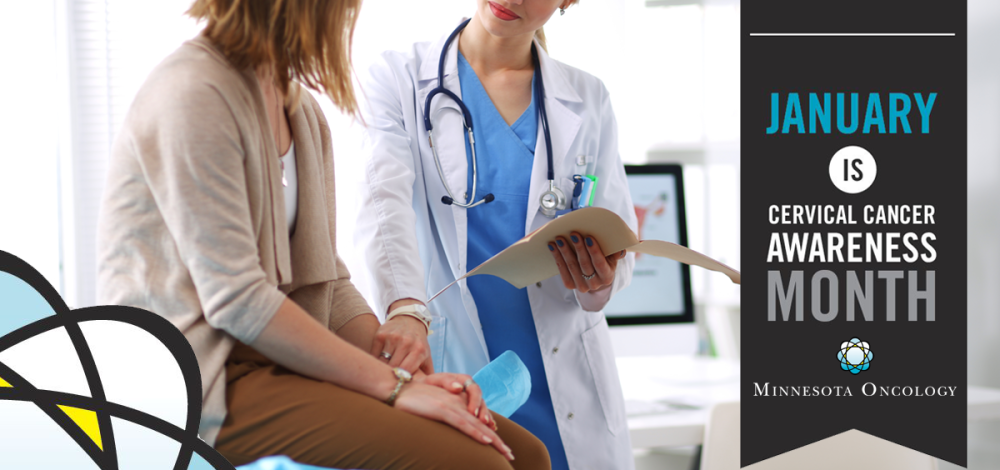Minnesota Oncology Reminds Women to Get Regular Pap Tests
The American Cancer Society estimated 13,960 women would be diagnosed with cervical cancer and 4,310 women would die from the disease in the United States in 2023. According to the National Cancer Institute, the key to preventing death from cervical cancer is regular screening to detect abnormalities in the cells of the cervix early, before they become cancerous.
January is Cervical Health Awareness Month, a time set aside to increase awareness of the disease and the importance of screening as a prevention strategy. Minnesota Oncology reminds all women to speak with their healthcare providers about being screened for cervical cancer.
A Pap test is a simple test performed in a physician’s office or clinic used to look at cervical cells. The physician or nurse scrapes a sample of cells from the cervix, and then smears the cells on a glass slide which is sent to a laboratory for viewing under a microscope for abnormalities. Finding and treating abnormal cells can prevent most cervical cancers, and screening can help find cancer early, when treatment is more likely to be effective.
Recommended screening for cervical cancer includes having a Pap test at age 21 or three years after first sexual intercourse, whichever comes first. Most women should have a Pap test at least once every three years. Women aged 65 to 70 who have had at lease three normal Pap tests and no abnormal Pap tests in the past 10 years may decide after speaking with their physicians to stop cervical cancer screening.
Human papillomaviruses (HPVs) are the main risk factor for cervical cancer. HPV is a group of viruses that can infect the cervix. They are very common and can be passed from person to person through sexual contact. Most adults have been infected with HPV at some time in their lives. Some types of HPV can cause damage to cells in the cervix, leading to genital warts, cancer and other problems.
In addition to HPV, risk factors for cervical cancer include:
- Weakened immune system – women with HIV infection of who take drugs that suppress the immune system have a higher-than-average risk of developing cervical cancer.
- Age – Cancer of the cervix occurs most often in women over the age of 40.
- Sexual history – women who have had many sexual partners have a higher-than-average risk of developing cervical cancer. Also, a woman who has had intercourse with a man who has had many sexual partners may be at higher risk of developing the disease. In both cases, the risk of developing cervical cancer increases because these women have a higher-than-average risk of HPV infection.
- Smoking cigarettes – women with an HPV infection who smoke cigarettes have a higher risk of cervical cancer than women with HPV infection who do not smoke.
- Prolonged use of birth control pills – using birth control pills for five years or more may increase the risk of cervical cancer among women with HPV infection.
Minnesota Oncology plays a major role in helping women in the Twin Cities and their families win the battle against cervical cancer by providing easy access to a full range of advanced cancer care services in a setting that allows patients to remain close to their homes and their support networks of family and friends.
Through its affiliation with The US Oncology Network, one of the nation’s largest networks of integrated community-based oncology practices dedicated to advancing high-quality, evidence-based cancer care, Minnesota Oncology can quickly bring the latest advances in therapies, research and technology to where patients live. As a result, patients access the best possible treatment with the least amount of disruption to their daily lives.
For more information about cervical cancer treatment, please call 844.317.4673 or request an appointment online.




